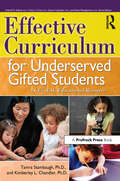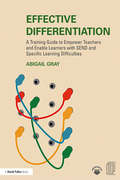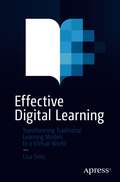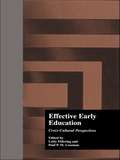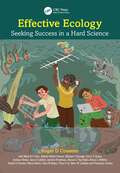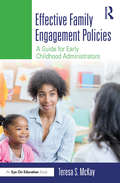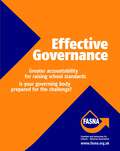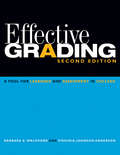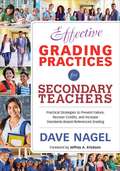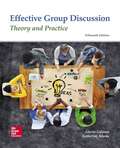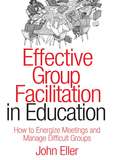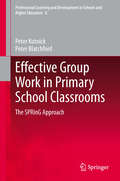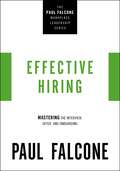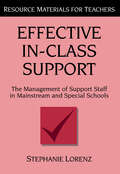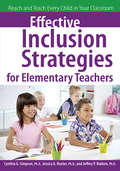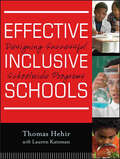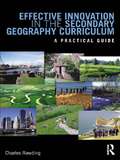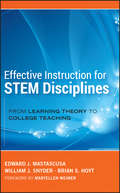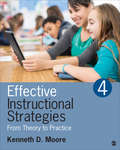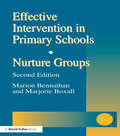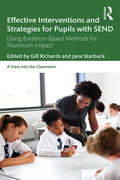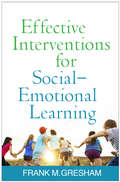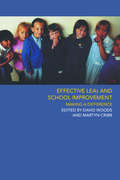- Table View
- List View
Effective Curriculum for Underserved Gifted Students: A CEC-TAG Educational Resource
by Kimberley Chandler Tamra StambaughEffective Curriculum for Underserved Gifted Students explains the need for a differentiated curriculum for gifted students typically underrepresented in gifted programs, including children of poverty and those who are from culturally and linguistically diverse populations. Features of research-based curriculum found to be effective in enhancing the academic achievement of these populations are highlighted. In addition, practical, evidence-based strategies for curriculum development and instruction are shared.
Effective Differentiation: A Training Guide to Empower Teachers and Enable Learners with SEND and Specific Learning Difficulties
by Abigail GrayPacked full of prompts, activities and practical ideas, this accessible and realistic guide provides teachers with a rich portfolio of strategies to ensure inclusion, and promote the learning of Special Educational Needs (SEN) pupils in the mainstream classroom. Unpacking SEN, demystifying jargon, and clarifying policy and good practice, Effective Differentiation encourages its reader to take a proactive approach to developing knowledge and skills in relation to Special Educational Needs Disability (SEND). Chapters address the challenges involved in successfully differentiating teaching to meet the diverse needs of individual children, and translate current research and policy into easy-to-understand concepts, integrating these into a framework for practical application. Taking self-evaluation as a starting point, the reader is invited to think, reflect, understand and finally – do! The perfect aid for the busy teacher, each chapter contains checklists and photocopiable tables which readers can use to record and track their own progress.
Effective Digital Learning: Transforming Traditional Learning Models to a Virtual World
by Lisa SimsTraditional learning as we know it has evolved. Gone are the days when students need to travel to a physical location to learn. With the increase of mobile devices and broadband Internet services, learning can take place anywhere at any time. Effective Digital Learning is here to help you make the paradigm shift with ease. More technology resources are available than ever to help people and organizations affordably present their information online. But, are they as optimized as they can be? Author Lisa Sims provides engaging and insightful tools and tips for delivering content online. Transform your traditional learning models and enhance your online learning models to fit the virtual world with Effective Digital Learning. Many organizations have recently made the jump from in-person conferences and training to providing all-virtual environments in order to keep employees, volunteers, and attendees safe and connected. Stay secure with the most up-to-date knowledge so that you, your organizations, and learners are always prepared. Whether you are a teacher, entrepreneur, or speaker, Effective Digital Learning is the ideal roadmap to have at your side on this innovative new journey. What You Will LearnDiscover how online learning can be an effective method of delivering information to target audiences Think outside the box when it comes to delivering content onlineStructure online learning to engage target audiencesWho This Book Is ForTeachers, entrepreneurs, speakers, and business owners (big and small) who are interested in delivering their knowledge via online platforms, but lack the technical expertise to make it happen.
Effective Early Childhood Education: Cross-Cultural Perspectives (Studies in Education and Culture #Vol. 11)
by Lotty ElderingThis work examines international strategies of early education and literacy for disadvantaged children, from a cross-cultural perspective. It brings together theoretical insights, the results of empirical research, and experiences with early educational intervention programmes.
Effective Ecology: Seeking Success in a Hard Science
by Roger D. CousensEcology is one of the most challenging of sciences, with unambiguous knowledge much harder to achieve than it might seem. But it is also one of the most important sciences for the future health of our planet. It is vital that our efforts are as effective as possible at achieving our desired outcomes. This book is intended to help individual ecologists to develop a better vision for their ecology – and the way they can best contribute to science. The central premise is that to advance ecology effectively as a discipline, ecologists need to be able to establish conclusive answers to key questions rather than merely proposing plausible explanations for mundane observations. Ecologists need clear and honest understanding of how we have come to do things the way we do them now, the limitations of our approaches, our goals for the future and how we may need to change our approaches if we are to maintain or enhance our relevance and credibility. Readers are taken through examples to show what a critical appraisal can reveal and how this approach can benefit ecology if it is applied more routinely.Ecological systems are notable for their complexity and their variability. Ecology is, as indicated by the title of this book, a truly difficult science. Ecologists have achieved a great deal, but they can do better. This book aims to encourage early-career researchers to be realistic about their expectations: to question everything, not to take everything for granted, and to make up their own minds.
Effective Family Engagement Policies: A Guide for Early Childhood Administrators
by Teresa S. McKayAligned with the National Association for the Education of Young Children’s Principles of Effective Family Engagement, this book helps early childhood administrators create effective family engagement policies that work. For each of the six key principles, this accessible guide walks leaders through the process of creating effective policy to engage families in their program. Filled with workable documents and templates to thoroughly scaffold the entire process, administrators will finish the work ready to implement the policies created, or build a plan tailored to their specific program. Designed for schools discouraged by the lack of engagement with all families, this book helps leaders strengthen the bond among home, school, and community.
Effective Governance: Greater Accountability for Raising School Standards: Is Your Governing Body Prepared for the Challenge?
by Joan BinderDo you know how school inspectors will be judging effectiveness? Have you considered how you can demonstrate the effectiveness of your governing body? This new guide takes a practical approach, with key questions, key actions and key information supported by case studies of good practice from a wide variety of schools. It will provide you with support and guidance in undertaking the responsibilities of governance. Each section links to the new Ofsted criteria, provides you with an understanding of 'effectiveness' and a framework of questions and actions which you can use to review your current practice and focus your professional development as a governing body. The case studies are centred on a key question from the relevant section and provide you with a 'live' example of how a school is demonstrating effectiveness.
Effective Governance: Greater Accountability for Raising School Standards: Is Your Governing Body Prepared for the Challenge?
by Joan BinderDo you know how school inspectors will be judging effectiveness? Have you considered how you can demonstrate the effectiveness of your governing body? This new guide takes a practical approach, with key questions, key actions and key information supported by case studies of good practice from a wide variety of schools. It will provide you with support and guidance in undertaking the responsibilities of governance. Each section links to the new Ofsted criteria, provides you with an understanding of 'effectiveness' and a framework of questions and actions which you can use to review your current practice and focus your professional development as a governing body. The case studies are centred on a key question from the relevant section and provide you with a 'live' example of how a school is demonstrating effectiveness.
Effective Grading
by Anderson Walvoord Barbara E. Virginia JohnsonThis new edition of the classic book has been thoroughly updated and revised with the latest research. The book offers a hands-on guide for evaluating student work and examines the link between teaching and grading. The authors show how to integrate the grading process with course objectives and offer a wealth of information about student learning. The book also includes information on integration of technology and online teaching, and is filled with more illustrative examples, including a sample syllabus. This revised resource can help any professor enrich student learning in the classroom.
Effective Grading Practices for Secondary Teachers: Practical Strategies to Prevent Failure, Recover Credits, and Increase Standards-Based/Referenced Grading
by Dave NagelEnact innovative grading systems that more accurately describe student progress! This book challenges traditional grading practices and provides alternatives that can have direct impact on student success. By making subtle shifts toward standards based grading systems, schools can reduce unnecessary course failures, provide students and their families a more accurate picture of current progress, and increase opportunities for success. The author offers a range of grading reform strategies that are built from practical frameworks that are effective and simple to adapt. Among the many strengths of this book are: Practical application of existing research and evidence base for effective secondary grading reforms A framework for schools and districts to apply and adapt failure prevention strategies such as early failure detection, Amnesty Days, and meaningful stipulated second chance opportunities for students to reach mastery Functional strategies and actions for shifting toward standards-based (referenced) grading without entirely abandoning letter grades Countering resistance to change through a-clearly-articulated plan for conducting school-wide and classroom level action research around the effectiveness of new or adjusted grading practices "Informative and pragmatic, this book is spot on with analysis of this elephant in the room issue. Nagel uses both empathy and humor in getting to the heart of a process to generate real solutions while underscoring the ultimate need for teacher voice in any successful implementation. He provides ready-made strategies for real, impactful change. I′m left hopeful that feedback will rule the day!" —Bruce Potter, Superintendent Berkshire UFSD "Nagel offers an insightful and articulate voice to secondary improvement and alignment through grading practices. His tried and true methods through working with real districts provides a starting place and examples for others to follow. A must-read for anyone serious about ensuring student engagement through meaningful feedback." —Debra K. Howe, Superintendent Tri-Creek School Corporation ?
Effective Grading Practices for Secondary Teachers: Practical Strategies to Prevent Failure, Recover Credits, and Increase Standards-Based/Referenced Grading
by Dave NagelEnact innovative grading systems that more accurately describe student progress! This book challenges traditional grading practices and provides alternatives that can have direct impact on student success. By making subtle shifts toward standards based grading systems, schools can reduce unnecessary course failures, provide students and their families a more accurate picture of current progress, and increase opportunities for success. The author offers a range of grading reform strategies that are built from practical frameworks that are effective and simple to adapt. Among the many strengths of this book are: Practical application of existing research and evidence base for effective secondary grading reforms A framework for schools and districts to apply and adapt failure prevention strategies such as early failure detection, Amnesty Days, and meaningful stipulated second chance opportunities for students to reach mastery Functional strategies and actions for shifting toward standards-based (referenced) grading without entirely abandoning letter grades Countering resistance to change through a-clearly-articulated plan for conducting school-wide and classroom level action research around the effectiveness of new or adjusted grading practices "Informative and pragmatic, this book is spot on with analysis of this elephant in the room issue. Nagel uses both empathy and humor in getting to the heart of a process to generate real solutions while underscoring the ultimate need for teacher voice in any successful implementation. He provides ready-made strategies for real, impactful change. I′m left hopeful that feedback will rule the day!" —Bruce Potter, Superintendent Berkshire UFSD "Nagel offers an insightful and articulate voice to secondary improvement and alignment through grading practices. His tried and true methods through working with real districts provides a starting place and examples for others to follow. A must-read for anyone serious about ensuring student engagement through meaningful feedback." —Debra K. Howe, Superintendent Tri-Creek School Corporation ?
Effective Group Discussion: Theory and Practice
by Katherine L. Adams Gloria J. GalanesNow in its fifteenth successful edition, Effective Group Discussion combines the most recent research findings and practical tools students need to become productive group members. A variety of secondary groups are covered in the text: work groups, committees, task forces, self-directed work teams, and other small groups whose objectives include finding solutions to problems, producing goods, and creating policies.
Effective Group Facilitation in Education: How to Energize Meetings and Manage Difficult Groups
by John F. EllerTap into proven do's and don'ts for facilitating dynamic and productive meetings. Get tips on team building, brainstorming, motivating, delegating, and more.
Effective Group Work in Primary School Classrooms: The SPRinG Approach
by Peter Blatchford Peter KutnickThis book offers a challenge to traditional approaches to classroom teaching and pedagogy. The SPRinG (Social Pedagogic Research into Groupwork) project, part of a larger research programme on teaching and learning funded by the Economic and Social Research Council (ESRC), was developed to enhance the learning potential of pupils working in classroom groups by actively involving teachers in a programme designed to raise levels of group work during typical classroom learning activities. Internationally, the SPRinG project is the largest evaluation of effective group working methods in comparison to traditional teaching, with findings that show raised levels of pupil achievement and a doubling of sustained, active engagement in learning. The opening chapters present arguments regarding the relationship of social interaction and children's cognitive development and examine theories that explain why social interactional processes should be integrated into primary school pedagogic practices. Next, the book describes the conceptual and methodological basis for the SPRinG studies, especially its focus on the relational approach, the type of involvement of teachers and classroom planning. Further chapters present key results and describe the background and methods used to establish SPRinG-based effects on pupil progress in mathematics, literacy and science, including both macro and micro assessments; how the SPRinG approach affected pupil-pupil interactions and teacher-pupil interactions, as measured by systematic on-the-spot observations and analyses of videotapes of groups working on specially designed tasks work; and effects on pupil self-completed measures of motivation and attitudes to group work. The book also analyses reflections of teachers who have worked with SPRinG: moving from theory to practice as well as adding insights associated with implementing SPRinG principles in schools. Drawing upon developmental psychological, social psychological and classroom research, it develops a new and ambitious social pedagogic approach to classroom learning, with a stress on group work, which will be of interest to researchers, teachers and policy-makers. This book includes contributions from Andrew Tolmie and Ed Baines, who were also involved in the ScotSPRinG and SPRinG projects.
Effective Hiring: Mastering the Interview, Offer, and Onboarding (The Paul Falcone Workplace Leadership Series)
by Paul FalconeSimplify the hiring process and put the right people in place the first time with the help of scripts, templates, and tools you can apply immediately, from the leading voice in HR expertise. Part operational field manual, part guiding hand, Paul Falcone, a renowned expert on effective hiring, performance management, and leadership development, walks you through some of the most critical people challenges you&’ll face and provides the keys to getting the results you&’re looking for during the interviewing, hiring, and onboarding process.Chock full of leadership wisdom from Falcone, this book:Examines the most often used interview questions and offers new interpretations when reading candidate responses.Identifies the red flags in the candidate assessment process, such as people who give long inventories of unproven claims that delay getting to the answer to your question.Provides small business owners who often struggle to meet crucial HR demands with simple tools to guide them through effective interviewing, hiring, and onboarding.Getting the best employees on board and weeding out the worst—without getting slapped with expensive lawsuits—are two of the most crucial and difficult jobs of human resources professionals and general managers. This book provides quick, reliable information on how to do it right. asy to understand series will serve as a reference for managers who need to quickly understand complex HR concepts.
Effective In-Class Support: The Management of Support Staff in Mainstream and Special Schools
by Stephanie LorenzFirst Published in 1999. Routledge is an imprint of Taylor & Francis, an informa company.
Effective Inclusion Strategies for Elementary Teachers
by Cynthia Simpson Jessica Reuter Jeffrey BakkenWritten in a very reader-friendly style with many examples and suggestions, Effective Inclusion Strategies for Elementary Teachers addresses some of the very important issues elementary school teachers face when working with students with disabilities. Topics include an overview of disability laws and definition of inclusion, followed by chapters on students with specific disabilities (autism spectrum disorders, ADHD, learning disabilities, emotional and behavioral disorders, speech and language impairments, hearing impairments, visual impairments, orthopedic impairments, and intellectual disabilities).The remaining chapters in this book discuss the very important topics of technology, collaborating with families, and Response to Intervention. This guide for elementary school teachers is a resource they can come back to over and over again!
Effective Inclusive Schools
by Thomas Hehir Lauren KatzmanHow to raise the achievement of all kids, from gifted to those with severe disabilities This book presents lessons learned from in-depth case studies of some of our most effective inclusive public schools. The authors conclusively demonstrate that schools can educate students with mild and severe disabilities in general education classrooms by providing special education services that link to and bolster general education instruction. This goes beyond complying with Special Education law; having a truly inclusive environment raises the achievement level for all students and results in more committed and satisfied teachers. Insights shared from teachers, school leaders, parents, and the students themselves provide a path forward for anyone striving to Improve special education services. The authors reveal what these exemplary schools do that makes them so successful, and provide advice for readers who want to incorporate these practices themselves. Hehir, former U. S. Office of Special Education (OSEP) Director, is a leading name in Special Education Highlights the important relationships between administrators, teachers, and parents to foster maximum collaboration between general and special education Includes information on committing to Universal Design for Learning (UDL) and Positive Behavior Supports This vital resource zeroes in on what excellent public schools do differently to ensure all students succeed.
Effective Innovation in the Secondary Geography Curriculum: A practical guide
by Charles RawdingHow up-to-date is your geographical thought? Are parts of your curriculum becoming tired and out-dated? Effective Innovation in the Secondary Geography Curriculum will help training and practising secondary school teachers understand how to evaluate and refresh their curriculum in order to ensure that what they teach is relevant, topical and creative. Considering the latest developments in both the school geography curriculum and the field of geography as an academic discipline, this exciting new book explores how geography teaching and learning can be developed to engage secondary school pupils and better reflect contemporary society. Illustrated throughout with ideas and practical examples of how to update your curriculum easily and effectively, key topics covered include: Understanding curriculum theory and development; Auditing and developing your own dynamic, interactive curriculum; Critiquing textbooks and resources to ensure relevance; Constructing and analysing schemes of work; Incorporating the latest developments in the field into your teaching; How to create innovative, enduring curricula for human, physical and environmental geographies. Providing insights into the latest thinking in geography in a concise and accessible manner, Effective Innovation in the Secondary Geography Curriculum will ensure motivating, lively and successful geography teaching and learning.
Effective Instruction for STEM Disciplines
by Maryellen Weimer Edward J. Mastascusa William J. Snyder Brian S. HoytThis groundbreaking book offers information on the most effective ways that students process material, store it in their long-term memories, and how that effects learning for long-term retention. It reveals how achieving different levels is important for "transfer" which refers to the learner's ability to use what is learned in different situations and to problems that might not be directly related to the problems used to help the student learn. Filled with proven tools, techniques, and approaches, this book explores how to apply these approaches to improve teaching.
Effective Instructional Strategies: From Theory to Practice
by Kenneth D. MooreA concise and easy-to-read K-12 methods text that covers practical information all teachers need to be effective Kenneth Moore’s Fourth Edition of Effective Instructional Strategies: From Theory to Practice provides thorough coverage of the strategies and essential skills that every teacher needs to know. This text applies the latest research findings and useful classroom practices to the instructional process by presenting a Theory to Practice approach to instruction, emphasizing the intelligent use of teaching theory and research to improve classroom instruction. Logically and precisely providing information about how to be an effective classroom teacher, this text has been carefully designed to maximize instructional flexibility and to model established principles of instruction. It was further designed to expand the pedagogical teaching knowledge of teachers and their instructional repertoires.
Effective Intervention in Primary Schools: Nurture Groups
by Marion Bennathan Majorie BoxallFirst Published in 2001. Routledge is an imprint of Taylor & Francis, an informa company.
Effective Interventions and Strategies for Pupils with SEND: Using Evidence-Based Methods for Maximum Impact (A View into the Classroom)
by Gill Richards Jane StarbuckEffective Interventions and Strategies for Pupils with SEND offers practical, tried-and-tested strategies for supporting and championing pupils with special educational needs and disabilities. Each strategy has been researched, trialled and reviewed, with the results presented accessibly and the concerns of real teachers a key focus of the discussion. With each chapter written by an experienced and innovative teacher working with children with SEND, this book covers a wide range of strategies for supporting pupils with SEND. These effective strategies include: Using a ‘daily run’ to improve concentration and behaviour Creating SEN champions and more effective teaching assistants Embedding anxiety-reducing strategies in the classroom. Written for teachers by teachers, Effective Interventions and Strategies for Pupils with SEND is an indispensable resource for all SENCOs and other educators and staff working with children with special educational needs looking to provide the best learning experiences possible.
Effective Interventions for Social-Emotional Learning
by Frank M. GreshamThis book reviews evidence-based, multi-tiered practices for promoting social-emotional learning (SEL) with typically developing students as well as those with special needs. Leading authority Frank M. Gresham, codeveloper of the Social Skills Improvement System--Rating Scales, describes how to systematically assess K-12 students' social skills and plan and implement universal, selected, and intensive interventions. His approach is grounded in cutting-edge research on social-emotional competencies and their role in adjustment and academic achievement. Emphasizing what works, the book showcases programs and strategies that are sequenced, active, focused, and explicit. Detailed case examples and lesson plans illustrate different levels and types of SEL intervention. Reproducible assessment tools can be downloaded and printed in a convenient 8 1/2" x 11" size.
Effective LEAs and School Improvement
by David Woods Martyn CribbEffective LEAs and School Improvement examines the ways in which Local Education Authorities can support and challenge schools to raise educational standards. The book includes case studies of effective LEAs and interludes from heads and governors on their experience of working with LEAs.Effective LEAs and School Improvement enables Local Education Authorities to learn from existing good practice and to reflect upon their current situation and plan ahead to meet future demands. It is essential reading for all LEAs concerned with raising educational standards.
